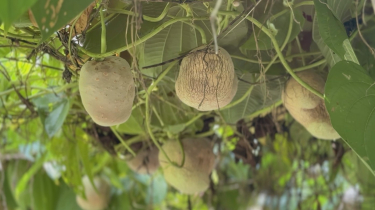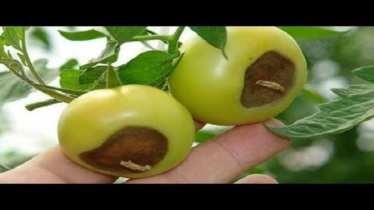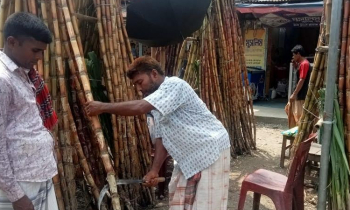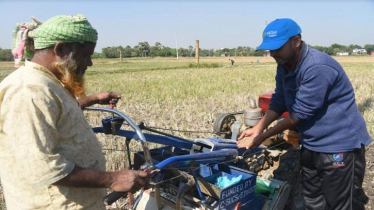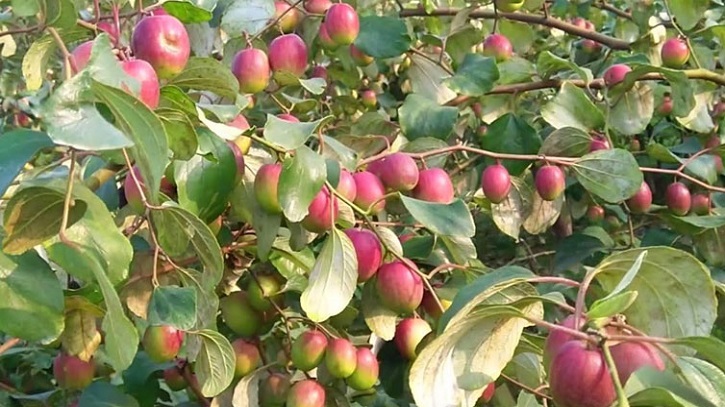
Over a decade ago, farmer Monsur Ali Khan began cultivating jujube (known locally as kul or boroi) on three bighas of land in Satkhira. Encouraged by the profits, he gradually expanded by leasing more land. Today, his jujube orchards cover 150 bighas, earning him recognition as the largest jujube farmer in the district.
According to the District Agriculture Office, nearly 32,000 farmers in Satkhira are engaged in jujube cultivation. In the current 2024–2025 season, jujube has been grown on 841 hectares across the district. The highest cultivation has taken place in Kalaroa with 470 hectares, followed by Tala with 165, Sadar upazila with 112, Kaliganj with 45, Shyamnagar with 25, Assasuni with 20, and Debhata with four hectares. So far, the district has produced an estimated 12,459 metric tons of jujube this year, generating approximately Tk 74.75 crore in wholesale sales at an average price of Tk 60 per kilogram. This figure is nearly Tk 8 crore higher than last year. In addition to seasonal jujube, farmers are also experimenting with year-round varieties.
In the 2021–2022 fiscal year, Satkhira produced 11,018 tons of jujube from 824 hectares, earning Tk 66.10 crore. In 2022–2023, 10,965 tons were harvested from 829 hectares, valued at Tk 65.79 crore. The following year, 11,210 tons were produced from 830 hectares, bringing in Tk 67 crore.
Farmers note that the sandy loam soil and temperate climate of Satkhira are ideal for jujube farming, which is why cultivation has spread to all seven upazilas. Local varieties include coconut, sour, and Thai apple jujube. Flowering begins in November, with fruits arriving in the market by February. Prices are highest early in the season, reaching up to Tk 150 per kilogram wholesale, before gradually dropping to around Tk 50 by April.
Commercial jujube farming began in Kalaroa in 2010 and has since spread across the district. Kalaroa remains the largest producing area, where farmers primarily grow three varieties—Thai Apple, Bol Sundari, and Golden Apple. Recently, limited cultivation of year-round jujube has also begun.
Two years ago, Abdul Majed, a nursery owner from Brojoboksh village in Kalaroa’s Helatola Union, successfully developed a perennial jujube variety after seven years of research. Planting 103 trees on 1.5 bighas of land, he now harvests 20–30 kilograms of fruit per tree annually. The year-round variety fetches Tk 250–300 per kilogram in the market, and he also sells seedlings for Tk 150–200 each. Majed expects sales of around Tk 12 lakh this year.
Kalaroa alone produced 6,580 tons of jujube this year, with cultivation costs of Tk 1.22 crore and sales valued at approximately Tk 6.5 crore, according to upazila officials. Women farmers are increasingly joining the sector. Sundari Begum from Koila began cultivating jujube on four bighas after observing her neighbor’s orchard, with per-bigha costs ranging from Tk 30,000 to Tk 35,000. She now sells her produce for Tk 150–200 per kilogram.
Other farmers, such as Nazrul Islam from Babulia in Satkhira Sadar, cultivate jujube on leased land. With a per-bigha investment of Tk 30,000–35,000, he earns Tk 100,000–150,000 per bigha.
The booming industry has given rise to at least ten specialized markets for jujube trade in the district, including Satkhira town’s Borobazar, Kazi Hat, Brojoboksh, Parulia, Nalta, Chhapra Bazar, Trishmail, Shakdah, Tala, and Atharomile. Of these, Borobazar and Kazi Hat see the highest volumes. Farmers sell directly to retailers and wholesalers, while middlemen often buy in bulk straight from the orchards. Demand peaks in February, and by March and April, as supply increases, large volumes are transported by truck and pickup vans to other parts of the country.
Agriculture officials say Satkhira’s jujube now enjoys a reputation nationwide, similar to the district’s famous mangoes. With high levels of vitamins A and C, calcium, potassium, and magnesium, the fruit contributes significantly to nutrition as well as income. Processed products such as pickles and chutneys made from raw and dried jujube provide additional revenue streams.
The Department of Agricultural Extension has launched projects such as MSCP, SSCP, and Rain Climate to support marginal jujube growers with fertilizers, pesticides, and financial assistance. Officials estimate that jujube accounts for 30–35 percent of Satkhira’s agricultural economy. District Agriculture Director Saiful Islam confirmed that Satkhira remains the country’s largest producer of the fruit, with supply extending to Dhaka, Khulna, Rajshahi, Rangpur, and Chattogram.


